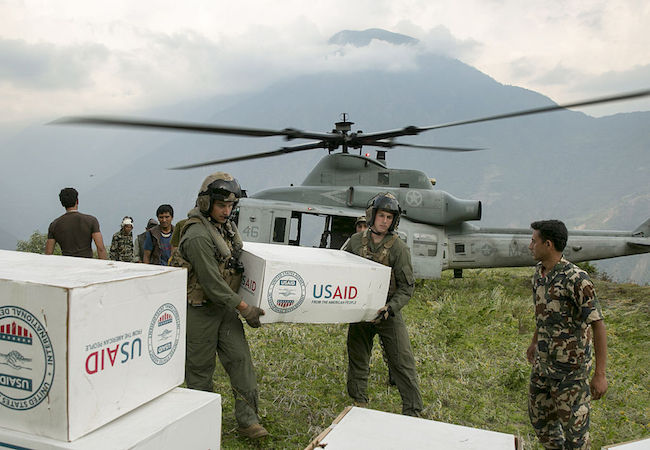
By Marla Mossman and Srimal Fernando
As the tidal waves crests on the shores of nations, deep below the surface, massive tectonic plates are on a collision course to upheave the continents. Moving at a much faster pace, liberal democratic and autocratic governmental systems are crashing together to form a new world order. As recent elections around the world indicate there is a groundswell of support for authoritarian populists.
The nexus of this clash may very well be the South Asia countries of India, Pakistan, Sri Lanka, the Maldives, Nepal, Bhutan, and Afghanistan. Active US participation in South Asian affairs is leading not only to closer economic integration with South Asian countries through America First Policy is enabling it to be a part of the security architecture. There are several positive signs in the defence relationship, including expanded political and security exchanges through dialogue on economic and regional security issues. China’s advances in economy, science and intelligence are the engines inspiring its grand multinational infrastructure projects. The One Belt, One Road initiative combined with the String of Pearls international plan of expanding ports and airports, the increase and modernization of it’s military; to the revival of the Maritime Silk Road; to the buildup of the South China Sea. This new economic imperialism threatens US military hegemony, buttressed by USAID’s billion-dollar humanitarian and economic largess.
Formed at the height of Cold War, a newly elected President John F. Kennedy issues an executive order on March 1, 1960 establishing the Peace Corps. His vision of an “army” of civilians who volunteer their time and skills to work in underdeveloped nations. This humanitarian mission to create a free and democratic world, still resonates. “Our own freedom,” Kennedy writes in his message to congress, “and the future of freedom around the world, depend, in a very real sense, on their ability to build growing and independent nations where men can live in dignity, liberated from the bonds of hunger, ignorance, and poverty.”
In 196Os the leadership of former US President John F Kennedy transformed the first US foreign assistance organization in the intervening years to a globally impacting organization whose primary importance was on long-range economic and social development assistance efforts to developing nations Kennedy issues a second executive order in 1962 to unite all the foreign assistance programs into the department of USAID, committing nearly 1 Billion annually, an enormous sum at the time. India became the largest recipient. Among the signature US projects in India that emerged from the Kennedy years was the Tarapur nuclear plant; IIT Kanpur, the Nagarjun Sagar Dam in Andhra Pradesh; and the Premier automobile factory in Mumbai.
This set the tone for all subsequent interactions. According to A Companion to John F. Kennedy, “no nonaligned state intrigued Kennedy as much as India.” America’s benevolence of financial and military support was reciprocated by India with its newly enlightened theory of non-violent persuasion. In 1959 Martin Luther King and his wife Coretta Scott King travelled to India to study Mahatma Gandhi’s principles of non-violence so they could apply it to the civil rights struggle back home. Their efforts led to The Civil Rights Act, which transformed America.
Today, these principles of Peace and Prosperity prevail where similar geo political forces are at play. USAID has become the world’s premier international development agency with a 2019 budget of over $39.3 Billion. According to its website; USAID’s work advances U.S. national security and economic prosperity, demonstrates American generosity, and promotes a path to recipient self-reliance and resilience.
Over the last five decades United States Agency for International Development (USAID) has a global footprint with operations in over 120 countries, functions in some 30 different program areas with an annual budget of around US$ 17 billion (USAID 2016). However South Asian countries have seen less allocations in 2018 from previous years with Pakistan receiving 1.1b in 2015 dropping to 127m in 2018. India saw a similar fall in 2015 from 105m to 14m in 2018. Sri Lanka experienced a perilous drop in theUSAID from $33m in 2015 falling to $2m in 2018
Recently, the United States’ foreign policy has stepped up its interest in South Asia for fear of widespread terrorism in region. With an increase in it’s military and forming closer relations with India to counterbalance China’s ambitions. One such plan to check China’s expansion was initiated by the Obama Administration. The “Pivot to Asia” strategy was designed to expand diplomatic and economic relationships with existing regional partners, particularly in East Asia and South Asia. This multinational approach emphasized with the formation of the Trans-Pacific-Partnership free trade deal know as TTP.
In the 56 years since USAID inception, there is a question of the US’s ability to sustain its humanitarian and diplomatic support. According to Harvard professor, Yascha Mounch, “…it’s impossible to predict the future of liberal democracy, without reflecting on the effects of decline in economic clout of western alliances.
Will the USAID’s shrinking budget escalate the demise of democracy?
Marla Mossman is the founder and Artistic Director The Peace Caravan Project; Srimal Fernando is a research scholar at Jindal School of International Affairs (JSIA) India and an editor of Diplomatic Society for South Africa.




